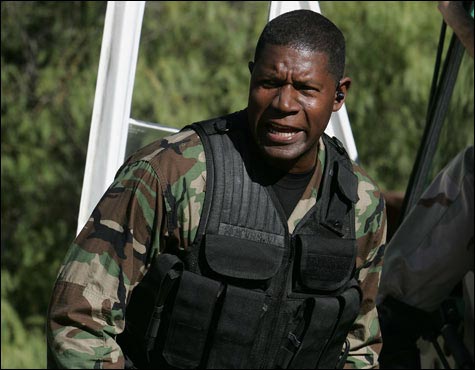
FORTIFIED WITH IRONY: Dennis Haysbert is Mamet's ace in the hole. |
Working with Mamet
Executive producer Shawn Ryan — who helped David Mamet and Eric L. Haney bring The Unit to the air in 2006 — says the idea "that drama is never the choice between good and bad but that drama is the choice between two bads" is something Mamet "has pounded into all of us." Although there are different writers for the show, Mamet reviews all the story ideas, "does a dialogue polish on each of the scripts," and continues to write and direct occasional episodes. (His sister Lynn is also one of the show's writers, specializing in the women's stories.)  As for the murky politics, Ryan says: "I don't think the show tries to take political positions." And regarding torture: "Eric Haney took the military position that torture was not an effective tactic. Now you can certainly take a political position, as well. But I think the thing you're noticing is that the show took a military position. What's great about these characters is that they almost don't have time for politics. There are very few true victories and very few true defeats on our show. It does exist in a slightly grayer area." |
Who but David Mamet would have the macho audacity to name his TV show after the male genitalia? But the title isn't the only way The Unit (Sundays at 10 pm on CBS) fits the bill for Mamet watchers. The Pulitzer-winning playwright is part of that disappearing breed, the unreconstructed macho man of letters. His Village Voice election-season blast of last year, "Why I Am No Longer a 'Brain-Dead Liberal,' " conjured Mamet in all his contradictory brilliance as America's most insightful and compelling crackpot. And The Unit is a compulsively watchable Mametian blend of inspired and loony.Based on Eric L. Haney's 2002 memoir, Inside Delta Force: The Story of America's Elite Counterterrorist Unit, the show, now in its fourth season, stars Dennis Haysbert as the group's leader, Sergeant Major Jonas Blane. With four fellow operatives, he travels the globe rescuing hostages, foiling terrorist plots, and occasionally assassinating a bad guy or two.
The obvious parallel is 24 (where Haysbert was once president of the United States). But Kiefer Sutherland and his gang are white-collar CIA spooks. Mamet's guys are blue-collar enlisted men. They live on Army-base suburban tracts, have messy domestic lives, and don't particularly care about politics — they're here to take orders and get the job done. They're highly skilled grunts. And, of course, The Unit doesn't have 24's unique plot gimmick of creating a season's worth of to-be-continued cliffhangers. Rather, story arcs develop in typical one-hour drama fashion, with only the occasional two-or-three-episode sequence or the occasional recurring subplot.
There's one other important difference. Despite all the phony hand wringing regarding Jack Bauer's gunpoint interrogations, the moral ambiguity in 24 is just window dressing for the suspense. With a few spectacular car crashes and some brutally violent murders, 24 is all about getting the bad guys before the clock runs out. The Unit, on the other hand, holds true to Mamet's dictum: "In the drama, the individual is forced to make a moral choice. This choice is never between good and evil (it would be clearly immoral to reject the good) but between two evils."
The Unit never limits that question to, say, "Torture this man or thousands of innocent people will die." Instead, there are choices between family and country, family and the unit, the possible death of an innocent in the pursuit of an ambiguous result. Bad guys get slapped around, but there's no systematic torture of suspects, and in one of the show's few multi-episode arcs, the unit actually blackmails its superiors into abandoning torture and a Guantánamo-like prison. Instead, the unit has to choose between putting one innocent at risk for the "greater good" — which is sometimes pretty murky. This is drama that implicates the viewer and doesn't provide easy answers.
In one of the best episodes, Jonas chooses a path that caused just such a good guy (in this case, a woman) to get killed — and not in some kind of collateral accident but as a pawn in the unit's game. One of the team's new members tries to reassure him: "You made the right decision. . . . You had no choice. . . . It was the right thing to do." Jonas looks back silently down the road to where the sympathetic victim has met her fate as the green team member keeps talking. Finally one of the veterans interrupts: "Stop talking. It doesn't help."
In some ways, The Unit is what Mamet said in a New YorkTimes essay about the revival of his play Speed-the-Plow: a "workplace drama," one where the stakes are not "the fate of the world" but "the fate of the individual under a particular set of circumstances." How will Jonas and his team respond, how will they weigh their conflicting loyalties?